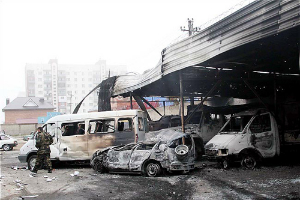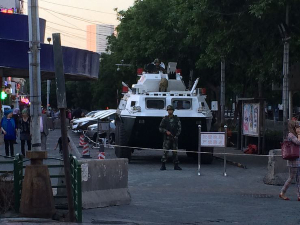CACI Analyst, April 29, 2015
Contents
Analytical Articles
RUSSIA'S REGULATION OF LABOR MIGRATION SET TO HURT CENTRAL ASIAN ECONOMIES, by Nurzhan Zhambekov
MOSCOW CFE KILL THREATEN CAUCASUS STABILITY, by Richard Weitz
CAUCASUS EMIRATE FACES FURTHER DECLINE AFTER THE DEATH OF ITS LEADER, by Emil Aslan Souleimanov
KAZAKHSTAN AND NEIGHBORS SEEK STRATEGIES TO COUNTER EMERGING THREATS, by Jacob Zenn
Field Reports
KYRGYZSTAN'S PRIME MINISTER RESIGNS, by Arslan Sabyrbekov
ISLAMIC STATE REACHES OUT TO GEORGIA, by Eka Janashia
ARMENIA'S PRESIDENT VISITS THE VATICAN, by Erik Davtyan
AZERBAIJAN DEMOTED TO EITI CANDIDATE, by Mina Muradova
CACI Analyst, April 15, 2015
Contents
Analytical Articles
CHINA AND PAKISTAN PREPARE TO ESTABLISH ECONOMIC CORRIDOR, by Ghulam Ali
DAGESTAN'S INSURGENTS SPLIT OVER LOYALTIES TO CAUCASUS EMIRATE AND IS, by Emil Souleimanov
GEORGIA'S ECONOMIC CRISIS AND POLITICAL BRINKMANSHIP, by Ariela Shapiro
THE CHINA-ARMENIA DECLARATION AND BEIJING'S PROSPECTS IN THE SOUTH CAUCASUS, by Eduard Abrahamyan
Field Reports
GEORGIA'S FORMER DEFENSE MINISTER BLAMES GOVERNMENT FOR DAMAGING STATE INTERESTS, by Eka Janashia
ARMENIA-EU RELATIONS ENTER A NEW PHASE, by Erik Davtyan
AZERBAIJAN AND THE IRAN AGREEMENT, by Mira Muradova
KYRGYZSTAN MARKS FIFTH ANNIVERSARY OF REVOLUTION, by Arslan Sabyrbekov
CACI Analyst, April 1, 2015
Contents
Analytical Articles
IRAN, A NUCLEAR TREATY, AND ITS NEIGHBORS, by Stephen Blank
THE PROSPECTS OF IS IN AFGHANISTAN, by Sudha Ramachandran
AZERBAIJAN AND KAZAKHSTAN FACE TOUGH ECONOMIC DECISIONS AMID DECREASING OIL PRICE, by Nurzhan Zhambekov
CONFLICT-RELATED VIOLENCE DECREASES IN THE NORTH CAUCASUS AS FIGHTERS GO TO SYRIA, by Huseyn Aliyev
Field Reports
KYRGYZSTAN'S PRESIDENT MAKES UNANNOUNCED VISIT TO MOLDOVA, by Arslan Sabyrbekov
PRIVATIZATION IN UZBEKISTAN: THE NEXT DOUBLE, by Umida Hashimova
ACUTE POLITICAL CONFRONTATION SIMMERS IN GEORGIA, by Eka Janashia
TAJIKISTAN'S OPPOSITION SUFFERS KIDNAPPINGS AND ASSASSINATIONS, by Oleg Salimov
Kabardino-Balkaria: Conclusion of Nalchik Trial Fails to Calm Volatile Republic
By Valeriy Dzutsev (01/22/2015 issue of the CACI Analyst)
Amid allegations of abuse, a highly controversial trial ended in lengthy prison sentences to suspected Islamic militants in Kabardino-Balkaria. An already violent republic may experience another spike of violence as the authorities demonstrate their lack of willingness to find political compromises. The absence of political mechanisms for bringing changes to the state system and economic recession are the two other major factors that will likely contribute to the deterioration of the security situation in the republic. Moscow’s reliance on crude force and refusal to use political dialogue to settle differences are contributing factors to the instability in the republic.

Turkistan Islamic Party Raises Profile in Syria
By Jacob Zenn (12/10/2014 issue of the CACI Analyst)
The Turkistan Islamic Party (TIP) is a Pakistan-based militant group operating with the Pakistani Taliban and Islamic Movement of Uzbekistan (IMU). Led by Uighurs from China’s Xinjiang Province (which the TIP calls “East Turkistan”), the TIP seeks the “liberation” of Xinjiang and its incorporation into a Central Asian Caliphate called “Turkistan.” In 2014, the TIP has sought to emphasize its role in Syria in its propaganda. This suggests that, like the IMU and some Pakistani Taliban factions, the TIP receives inspiration and seeks funding from the Islamic State (also known as ISIS). This is but one of many examples of ISIS’s increasing traction among Central Asian militants.





